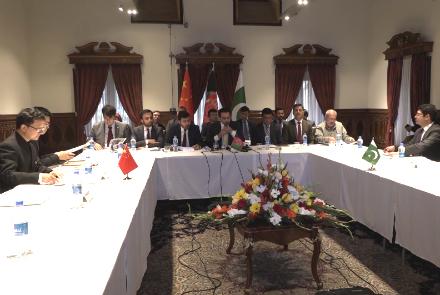Senior officials from Afghanistan, China and Pakistan on Monday gathered in Kabul where they discussed the results of last year’s Afghanistan-Pakistan-China foreign ministers dialogue and ways on how to expand cooperation between the three countries in various spheres including trust-building measures between Kabul and Islamabad, economic cooperation and fight against terrorism.
At the meeting, Afghan Deputy Foreign Minister Edris Zaman warned that even if a potential peace agreement is on hand, threats which are emerging from insurgency in Afghanistan will not be eliminated completely and that there is a need for collective efforts to fight terror groups without any distinction.
“With a settlement in Afghanistan, the challenge of terrorism will not be eliminated fully in the region,” Zaman said. “To eliminate terrorism it will require state-to-state cooperation to fight all terrorist groups without any distinction. Finally important topic of this trilateral (meeting) which is the focus of today’s discussion is development cooperation and connectivity.”
Meanwhile, Chinese Ambassador to Afghanistan Liu Jinsong said Afghanistan should not be a battleground for major powers, but it should be a place for regional connectivity.
“All these kinds of jobs, all these processes (should be) based on the principles of Afghan-led and Afghan-owned and Afghan government should play a leading role in this process. As a country just wants to support you and we don’t like any kind of approach led to make any so-called power game in this country,” said Liu.
Pakistan’s Ambassador to Afghanistan Zahid Nasrullah Khan said the regional countries and Pakistan are cautiously optimistic about Doha talks.
“I think the entire region is cautiously optimistic and we are also optimistic and hopeful that Doha talks would be very successful and they eventually lead to intra-Afghan talks which is extremely important for any peace agreement with the US. Pakistan has played its role in that, in persuading the Taliban to come to the table on Doha talks and to bring their credible interlocutors in Doha talks,” he said.
The Second Afghanistan-China-Pakistan Foreign Ministers’ Dialogue was held last December in Kabul where the three sides, once again, reaffirmed their commitment to further strengthening their relations, deepening cooperation and advancing connectivity under the Belt and Road Initiative (BRI), Regional Economic Cooperation Conference on Afghanistan (RECCA) and other regional economic initiatives.
They agreed to promote China-Afghanistan-Pakistan trilateral cooperation under the framework of jointly building the Belt and Road Initiative. Meanwhile, they reiterated their strong resolve to fight terrorism in all its forms and manifestations, and without any distinction.


Comment this post